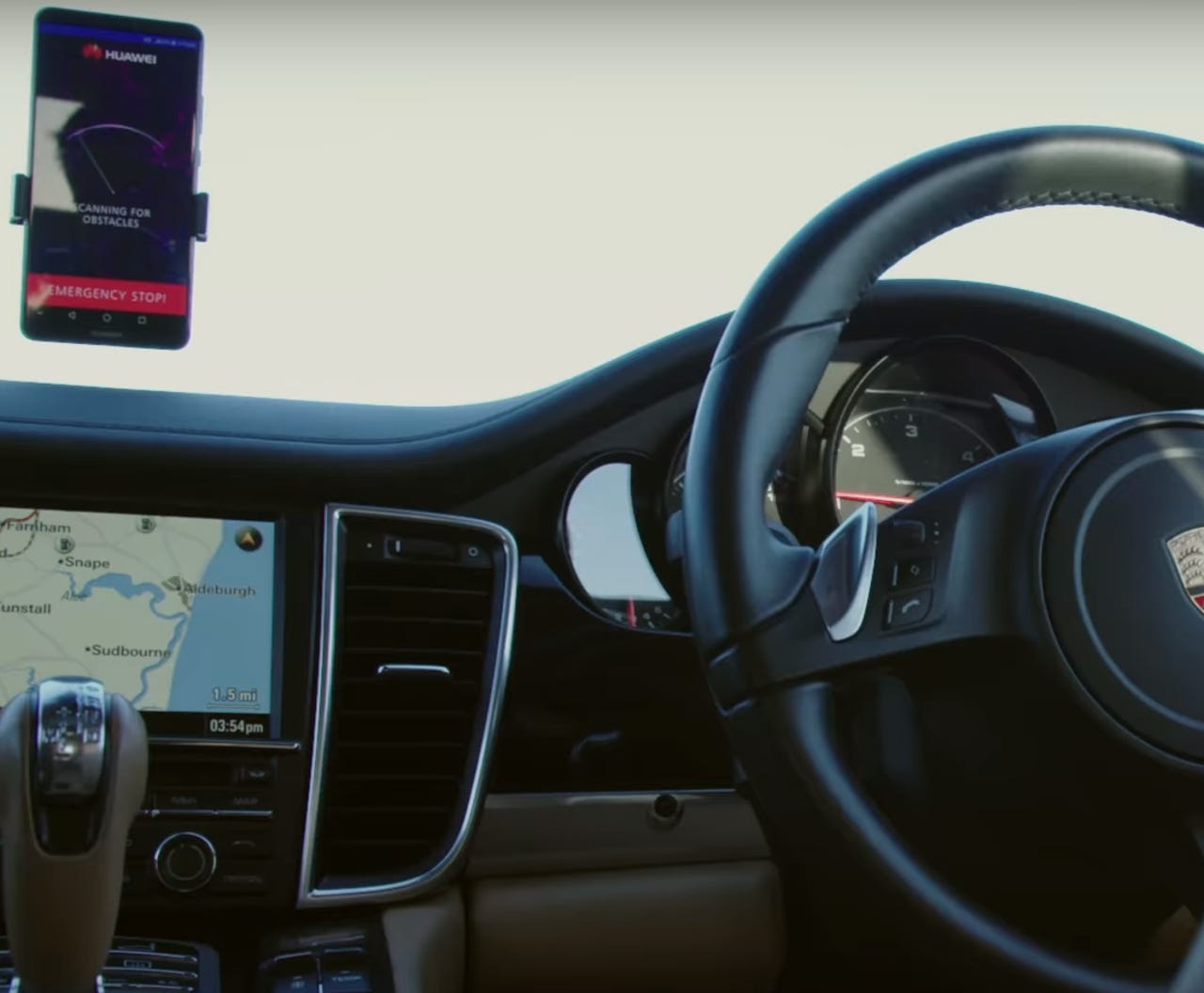Huawei uses Mate 10 Pro AI to control driverless car


Huawei has extended its artificial intelligence (AI) interests into the realm of driverless vehicles, announcing on Thursday that it has used an AI-powered smartphone to drive a car.
Under its RoadReader project, Huawei said it has used its Mate 10 Pro device to conduct intelligent object recognition to distinguish between thousands of different objects including dogs, cats, balls, and bicycles and "learn to take the most appropriate course of action".
"Unlike other driverless cars, which simply detect obstacles, Huawei has transformed a Porsche Panamera into a driverless vehicle that doesn't just see, but crucially understands its surroundings," the Chinese tech giant said.
Automatic object-recognition AI capabilities were originally included in the Mate 10 Pro in order to improve photography, with Huawei saying this technology can be reused instead of relying on a third-party purpose-built chip.
According to Huawei Western Europe CMO Andrew Garrihy, it then took the company only five weeks to achieve this feat with its technology.
"Our smartphone is already outstanding at object recognition. We wanted to see if in a short space of time we could teach it to not only drive a car, but to use its AI capabilities to see certain objects, and be taught to avoid them," Garrihy said.
"The next element that's more intelligent is then that information is used by the car to allow it to manoeuvre accordingly. The fact that this is built into the phone means that that recognition happens in a heartbeat," Peter Gauden, global senior Product Marketing manager at CBG London Hub, Huawei Technologies, added in a video.
Huawei's AI push also saw it sign a strategic agreement with Chinese search engine giant Baidu in December to build an open mobile AI ecosystem that covers platforms, technology, internet services, and content ecosystems.
The open ecosystem will be built using Huawei's HiAI platform and neural network processing unit (NPU), and Baidu's PaddlePaddle deep-learning framework and Baidu Brain, which contains Baidu's AI services and assets. It will allow AI developers to make use of the technology.
Under the partnership, Baidu and Huawei will also work on improved voice and image recognition on smart devices, and will build a consumer augmented reality (AR) software and hardware ecosystem.
Also working on developing autonomous driving and autonomous vehicles, Baidu is hoping to utilise Huawei's large customer base for the mobile AI project.
Huawei head of Consumer Software Engineering and director of Intelligence Engineering Felix Zhang had in November said the addition of AI capabilities to smartphones will bring the next shift in technology, comparing AI to the advent of steam engines in terms of its capacity to fundamentally change people's lives.
Mobile AI will change two key aspects of the smartphone, he said: User-machine interaction, and "context-personalised openness".
The first aspect will improve efficiencies between the user and their phone across text, voice, image, video, and sensors, while the second will actively provide services and aggregated information across apps, content, third-party features, and native features, he explained.
"If you look at the whole ecosystem, the AI will fundamentally change the phone from the smartphone to the intelligent phone," Zhang said.
Huawei had unveiled its Kirin 970 chipset with built-in AI in September, at the time calling it the "future of smartphones". Its mobile AI is made up of a combination of on-device AI and cloud AI.
"Huawei is committed to developing smart devices into intelligent devices by building end-to-end capabilities that support coordinated development of chips, devices, and the cloud," Huawei Consumer Business Group CEO Richard Yu said at the time.
"The ultimate goal is to provide a significantly better user experience. The Kirin 970 is the first in a series of new advances that will bring powerful AI features to our devices and take them beyond the competition."
Limitations in cloud AI necessitated improvements across latency, stability, and privacy, Huawei said, with on-device AI providing this as well as adding sensor data to the offering.
Its flagship smartphones, the Mate 10 and Mate 10 Pro come kitted out with the AI-focused Kirin processor, which has the dedicated NPU that is able to process 2,000 images per minute via image-recognition technology.
Huawei additionally provided the Kirin 970 as an open platform for mobile AI developers and partners in order to drive further developments.
Related Coverage
UK budgets $99M for AI, clears legal barriers to get driverless cars on the road by 2021 (TechRepublic)
A proposed UK budget is expected to include significant funds for artificial intelligence, electric car plug in points, and 5G mobile networks.
Video: The future of driverless cars (TechRepublic)
At Mobile World Congress Americas 2017, Barbara Peng, a research vice president at BI Intelligence, discussed how cities, laws, and drivers will need to adapt to driverless cars.
Pizza Hut says driverless delivery could create more jobs than it destroys (TechRepublic)
Pizza Hut and Toyota are partnering on a fully-autonomous pizza delivery concept vehicle, and some Twitter users weren't pleased.
The X-factor in our driverless future: V2V and V2I
The technology behind how vehicles communicate with one another and their surrounding environment will be the linchpin for the success of autonomous vehicles.
New Australian regulations to support driverless vehicles
Introduced by ACMA, the new regulations will enable the roll out of intelligent transport systems by Australian road traffic authorities.
Hyundai and Volkswagen partner with Aurora Innovation for driverless cars
The two motoring giants have separately teamed up with Aurora Innovation to bring the reality of self-driving cars one step closer.
Crash halts driverless bus test in Las Vegas
The bus was touted as the United States' first self-driving shuttle project for the public before it hit a semi-truck.
Mobile device computing policy (Tech Pro Research)
Mobile devices offer convenience and flexibility for the modern workforce-but they also bring associated risks and support issues. This policy establishes guidelines to help ensure safe and productive mobility.